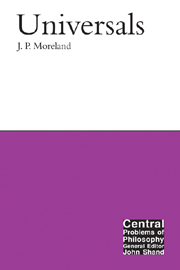Book contents
- Frontmatter
- Contents
- Preface and acknowledgements
- 1 The problem(s) of universals
- 2 Extreme nominalism and properties
- 3 Moderate nominalism and properties
- 4 Minimalist realism: Wolterstorff's kinds and Armstrong's properties
- 5 Traditional realism: properties are abstract objects
- 6 Traditional realism: issues and objections
- 7 The individuation of particulars
- Notes
- Bibliography
- Index
Preface and acknowledgements
- Frontmatter
- Contents
- Preface and acknowledgements
- 1 The problem(s) of universals
- 2 Extreme nominalism and properties
- 3 Moderate nominalism and properties
- 4 Minimalist realism: Wolterstorff's kinds and Armstrong's properties
- 5 Traditional realism: properties are abstract objects
- 6 Traditional realism: issues and objections
- 7 The individuation of particulars
- Notes
- Bibliography
- Index
Summary
This book is a study in analytic ontology with a focus on issues and options at the core of the problem of universals. The problem of universals is actually a cluster of related issues central to debates among extreme nominalists, moderate nominalists and advocates of various forms of realism about the ontological status of properties. The book is intended to be an introduction to the topic and I have aimed the level of exposition at upper level undergraduates, graduate students and professional philosophers, and I believe the book should be of value to all three groups. Given the intended audience, the book is an introduction, not in the sense of being aimed at beginning students in philosophy, but in the sense of seeking to focus on the most important issues central to the subject matter. Because of this focus and space limitations, I have of necessity refrained from addressing certain topics in the study of universals that have been prominent in the past ten years, specifically: the relationship between higher and lower order universals; the relationship between universals and causation, laws of nature and scientific explanation; the use of moderate (especially trope) nominalism to do work in various areas of philosophy. As interesting as these topics may be, those who study them bring to their reflections positions on the more fundamental topics about universals. And, often, philosophers who discuss these current issues seem unfamiliar with or inadequately appraised of important distinctions and arguments at the core of those more fundamental topics.
- Type
- Chapter
- Information
- Universals , pp. vii - viiiPublisher: Acumen PublishingPrint publication year: 2001

